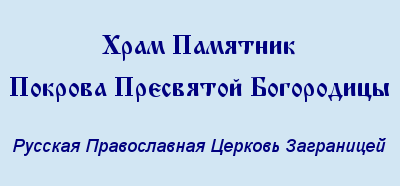Dear Brothers and Sisters,
Congratulations with the feast of the Resurrection of the Lord, as well as with the feast of All Russian Saints!
Usually we celebrate the memory of these saints on the second Sunday after the feast of the Descent of the Holy Spirit on the Apostles, but this year, because of the feast of the Nativity of St. John the Forerunner, the memory of the Russian Saints has been transferred to today, the third Sunday after Pentecost.
Let’s remember that today’s feast was established relatively recently, in 1918, when the Russian Empire ceased to exist, a civil war began, and the new anti-Christian, Communist government began to destroy the old order, not only in the government, but also in the everyday lives of regular citizens, so as to build on the ruins of the old, according to them, something better. Naturally, this was a very difficult time. So as to hearten the people, remind them of that which was good in the past, and perhaps in such a manner avert a catastrophe, today’s feastday was established.
In last night’s service, all the saints who struggled on the territory of the former Russian Empire, from the first century of the Christian era up until our days, were glorified. Here we have not only Russians, Ukrainians, and Belorussians, but also Germans, Greeks, Romans, Bulgars, English women, Chinese, Lithuanians, as well as representatives from many other nations. The one thing that binds them together, apart from them living within the territory included in the Russian Empire as it was at the beginning of the 20th century, was their faith in the Lord Jesus Christ.
For some, today’s feastday may seem outdated and not politically correct. Tsarist Russia ceased to exist long ago. Today to speak of unity even among the Slavic, Orthodox nations of that empire is impossible. For others, on the contrary, this feast may be very appealing, for it is easy to rework that original idea which led to the establishment of today’s celebration and to project certain new ideas onto the present geopolitical reality. Probably both the first and second approaches are incorrect and unbecoming of Orthodox Christians.
Today’s feastday is, of course, not outdated and is, on the contrary, truly wonderful and relevant. It seems to me that last evening’s service wonderfully transmits the ecumenical character of the whole Church of Christ, because it mentions by name a great many very diverse saints from different social strata, governments, and times. The idea that the Church is a congregation of separate people around our Lord Jesus Christ is clearly felt. Of course, these saints did not simply gather around the Saviour, but communed in the most literal sense of His Body and Blood, became members of His Body, and in such a way were also joined one to another, despite everything that separated them here on earth, be it time, place, international borders, or language.
Today the whole world talks about unity and inclusivity, but in reality there is none of this. On the contrary, it seems that our world and human society is splintering into smaller and smaller units. One could think that today’s feastday gives us an answer to this problem. It is futile to look for unity and happiness in different social or political ideologies or messages. We can find a lasting unity in the Church with Christ at its head. Today let’s pray that we find spiritual unity amongst ourselves in Christ, as today’s saints did in the past.
priest Alexis







